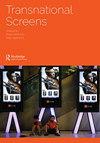Transnational Latin American Television: genres, formats and adaptations
IF 0.4
0 FILM, RADIO, TELEVISION
引用次数: 0
Abstract
captures the particularity of the non-western political cinema of this age without getting lost in the outer reaches of Deleuze-speak. Curiously, despite explicit engagement with complex post-structuralist thinkers, Holtmeier frequently rests within the liberal-phenomenological. Holtmeier asserts that ‘film is an affective medium’ (19), that ‘cinema brings verisimilitude to politics by depicting the lived experiences of individuals caught in the midst of these cultural clashes’ (40), and in approaching mainstream critique of ISIS militants as overly humanised in Abderrahmane Sissako’s Timbuktu (2015), Holtmeier demurs that they are not ‘humanized so much as their militant subjectivities are compromised and complicated.’ (77) So – humanised then? If ISIS fighters are not individual agents who spend time grooming children or travelling to warzones and damning local culture but ‘complicated, globally networked subjects’ (78) then exactly what liberation or progress beyond neoliberalism and boundaries and precarity is made? Holtmeier is strong and precise when unpacking the subtle juxtapositions of globalism and fundamentalism in Timbuktu and more, but it is unclear which politics are being served in this analysis of the political cinema.拉丁美洲跨国电视:类型、形式和改编
抓住了这个时代非西方政治电影的特殊性,而没有迷失在德勒兹话语的外围。奇怪的是,尽管与复杂的后结构主义思想家有明确的接触,霍尔特迈尔经常停留在自由现象学的范围内。霍尔特梅尔断言“电影是一种情感媒介”(19),“电影通过描绘陷入这些文化冲突中的个人的生活经历,为政治带来了真实性”(40),在Abderrahmane Sissako的《廷巴克图》(2015)中对ISIS武装分子过度人性化的主流批评中,霍尔特梅尔提出异议,认为他们没有“人性化,因为他们的激进主观性受到了妥协和复杂。”“那么——人性化了?”如果ISIS战士不是花时间培养孩子或前往战区并诅咒当地文化的个体代理人,而是“复杂的、全球联网的主体”(78),那么究竟是什么解放或进步超越了新自由主义、边界和不稳定性?在剖析廷巴克图等地的全球主义和原教旨主义之间微妙的对比时,霍尔特梅尔表现得有力而精确,但不清楚他对政治电影的分析是在为哪一种政治服务。
本文章由计算机程序翻译,如有差异,请以英文原文为准。
求助全文
约1分钟内获得全文
求助全文
来源期刊

Transnational Screens
Arts and Humanities-Visual Arts and Performing Arts
CiteScore
0.60
自引率
0.00%
发文量
23
 求助内容:
求助内容: 应助结果提醒方式:
应助结果提醒方式:


